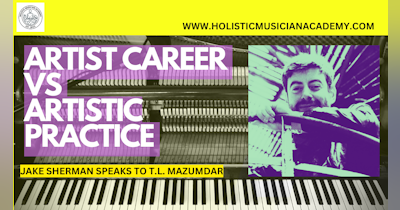Are you sat at your instrument grappling with your demons cos you want to get better and aren't sure how? Minutes after you were all set to connect to your inner rock-star? Only to feel lost after the initial high of the first notes faded?
Been there.
It hurts, right?
I consider my 20 + years as a professional musician/educator an ongoing journey. One I travel as a student one way or the other. There have been themes along the way that have been somewhat surprisingly transient in the nature of their relevance. And those which haven't.
The search for the perfect practice routine is one that continues to fall in the latter category.
The reasons behind this are possibly beyond the scope of one blog post.
But if I were to boil it down to one irrefutable, factor, it would be this:
The subjective nature of success.
Whether success is a 'goal' in the first place is a serious contender for some potential debate in itself. But allow me to point your attention to the focal theme here:
Defining Success.
And how a healthy, sustainable practice routine is probably our best shot at it.
Here's a 7-step process that has helped me.
STEP 1: Find Your 'Why'
A part of me cringes every time random self-help resource number 32,010 uses that quote.
But here's the thing: those of us in this for the long haul will find ourselves at a point eventually where we ask ourselves, 'Why the F am I doing this?'.
In my books, that's is not a sign of jaded cynicism, but maturity.
No matter how much we love our art, the line between 'go with the flow' and our practice becoming meaningless is finer than we are ready to admit.
The blissed-out teenager seeking his social avatar. The manic college music- student meeting recital-performance deadlines. The busy professional looking for a meaningful past-time. And the professional musician who depends on his food and shelter on his art. All of these have been roles I have embodied on some level or the other. And they all have one thing in common.
There's a reason they chose to make music a part of their life.
The difference between that reason remaining a vague gut feeling you don't choose to investigate, and making a conscious decision to do so instead, can be that shift in perspective that takes your practice to the next level.
Why do you play music?
To heal?
Cos you feel it's just an inherent part of who you are?
Is it what you do for a living and can't think of doing anything else?
Or maybe to just let off some steam at the end of a day?
Do you do it to feel eternally youthful?
Grow constantly?
Look cool?
Feel sexy?
Celebrate?
Grieve?
Find God?
All of the above?
Every single one of the aforementioned is a legit 'why' if you own them. Authentically.
And once you do - boom! The first and most important step has been taken.
STEP 2: Find Your 'What'
Now that you've figured out why you play music, it's time to focus on what you want your next phase of growth to be.
The most beautiful part of any art, particularly music, is the infinite list of things you can improve upon. Our time to practice though, is not.
Here are a few common examples of things to work on:
- Are you classically trained and want to learn to play by ear?
- Have you been playing in bands all your life and would like to dig deeper into your solo piano chops?
- Inversely, have you played alone most of your life and would like to learn to fit in in an ensemble?
- Do you want to improve your timing? Maybe finally make friends with a metronome? Or develop deeper skills to understand and 'feel' a groove better?
- Better still, both of the above?
- Have you learned music by doing all your life and feel the need to start or brush up on your sight-reading?
- Would you learn to improvise like a pro?
- ALL of the above? (Ok, probably not the best idea in this case).
Each of these and many more are super legit topics to start working upon. But you can't do all of them at once.
So define a minimum of 3 and a maximum of 5 short-term goals you want to work on.
STEP 3: Get Real With Your Time.
Nothing to do with a metronome (not just yet)!
I'm talking time management here. The sort of thing I thought only corporate dudes in stuffy shirts talked about. As I lounged about in pajamas with my unruly teenage hair fashionably getting in the way of my piano.
Turns out that developing a long-term relationship with art isn't as exempt to that part of the lifestyle after all.
The good news? It's actually fun!
'Freedom is only the other side of discipline' #awisemanoncesaid.
In my case, once I had a basic roadmap of what I wanted to work on, I ended up with a lot more time actually doing what I loved.
Blissing out and 'being in the flow'.
Start off with setting a realistic amount of hours you are ready to dedicate to working on music every week.
I recommend a minimum of 3, and a maximum of 30 hours. The latter, for professional musicians/artists or serious/full-time music students.
STEP 4: Portion Control
Next, divide the number you've settled on for your week into daily portions.
They don't have to be the same-size portions. The goal is to make sure that the portions eventually add up to your weekly goal.
There's a catch though: you need to make sure that you're dividing it over a minimum of four days.
So if your goal is 6 hrs a week, don't stuff all of that practice into one day. Chances of that being a sustainable and productive routine are about as high as attaining long-term fitness goals by doing all of your exercises in one go. After a remaining week of no exercise, poor diet, and self-care.
Trust me on this. As a professional musician AND a severe obesity survivor-turned certified personal trainer, it's a potentially vicious cycle of self-loathing waiting to happen.
Alternatively, this is what happens when you stick to the healthier variant. One where you trust in a more holistic, gradual process.
You make QUALITY progress!
Not just learning a random lick, etude, or piece here and there. But foundational, long-term, sustainable, and eventually exponential growth. The kind that gets to be a part of your musical personality for keeps.
(Note: if you have a teacher or a coach try to avoid practicing on the day of your lesson /session )
Portion your practice. I recommend sessions of 10, 15, 30, 45, and 60 minutes 2-5 times a week.
STEP 5: Keep A Log
Now that you've understood Step 5, all you need is a legit plan to implement it.
One of the best ways to do this is to start keeping a weekly log of your practice.
This might just be the closest thing you can get to a coach or teacher who makes sure you're on target and focused. Without actually having one.
Why?
Because a log helps you :
- Plan the individual 'portions' for your practice. Over the entire week beforehand.
- Monitor your progress.
- Develop strategies to keep improving your practice system.
Speaking from experience, this simple tool can be a game-changer!
There is something deeply and authentically fulfilling about writing down what you intend to do with your week. Try your best shot at it. And see how close you've come to nailing it at the end of the week. You're making an agreement with yourself. And honoring it builds trust in your own abilities. The signals you hence send out to yourself build a foundation for a mindset that can be extremely empowering and healing.
A couple of caveats:
Remember to be kind to yourself on occasions you didn't 'nail it'. Comes with the territory.
There are no failures here. If you nailed it, yay! If not, you know what to do. Give it a better shot next week. And be true to that commitment.
Remember that the goal is the process itself. As long as you're at it in a healthy manner, you're being a winner no matter what. Palpable results of the same are only a side-effect you will get to see soon enough when the time is right.
(You can download my free practice log that I've been using for myself, my students and clients, here).
STEP 6: Remove Distractions
Duh.
Wait, not so fast!
Artists aren't necessarily known to think linearly.
Who knows when a distraction turns into inspiration.
Also, some of us have families. A kid to take care of. A mom we're crashing with (cmon!).
Unfamiliar surroundings to deal with during travel or touring.
When we look at it as plain black and white, there's a certain type of division that threatens to set in. Between the realities of everyday life and the role, music plays within it.
The idea here is integration.
I'm all for immersive experiences like musical retreats and artist residencies (both of which I've been privileged enough to participate in).
But the long haul is as good as the consistency in your lifestyle. One that integrates your art organically.
That being said, here are seven everyday pointers that have helped me improve the quality of my practice over the years. While probably not fool-proof I daresay they're worth taking a shot at:
* Putting my phone into flight mode while practicing. (No-brainer).
*Finding a time of the day where I know my chances of quality 'me-time' are higher.
*Letting my co-inhabitants know I'll be practicing.
*Tidying up my space before I start my practice (before you hate me, I'm not talking spring-cleaning here). Just make sure there's minimal to no clutter in your immediate space that might hamper your playing.
* Warming up before I play. And yes that means before I touch my instrument I'm not referring to warm-up scales and/or arpeggios and the likes.
*Using a timer for the duration of the practice. That way your portion control is overseeable.
* And last but not least, taking a minute before or after my practice to be grateful. For the blessing music is. Even if it was a bad day (especially more so!). Cos regardless of what your belief systems are, gratitude is never an emotion that ever goes to waste.
STEP 7: Find Accountability
The seventh and final step I recommend is finding a method of accountability.
Find someone you are accountable to. Someone who will kick your butt when it needs one and remind you to be kind to yourself when you're being too harsh.
Egg you on when you need it. Slow you down when you're rushing it.
Your options here are:
- A dedicated coach/teacher
- A friend you trust. This could be a band-mate, random friend, partner, or someone from a like-minded online community.
I'd be doing you a disservice if I said that the latter is as effective as a trained, professional. But it's definitely better than no accountability.
Either way, it can make a world of difference to be reminded that you're not alone in this. On a regular basis.
So there you have it. Your seven-step strategy to up your practice game!
Summary
- Set long-term goals
- Set short-term -goals.
- Set weekly hours.
- Divide it into daily portions.
- Keep a Log.
- Remove distractions.
- Find accountability.
- Rinse and repeat.
Bear in mind we are unique individuals with our quirks and no path will be the same for everyone. Only you get to choose what yours will be.
The beauty, freedom, and scary aspect to that is though, is exactly what makes this journey worth taking.
Much Love.
T.L.



